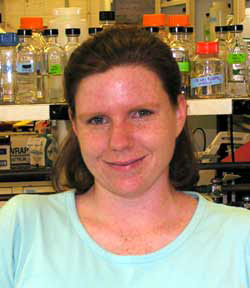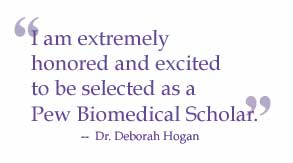|
|
For Release: June 27, 2005
Contact: Andy Nordhoff (603) 650-1492
Pew Charitable Trusts Name Dartmouth Medical School Researcher as Biomedical Scholar
Highly selective program identifies scientists who will advance medical frontier

Deborah Hogan, PhD
HANOVER, NH - Dr. Deborah Hogan, a gifted researcher in Dartmouth Medical School's (DMS) microbiology and immunology department, was named a 2005 Pew Biomedical Scholar for her insightful work on how bacterial interactions affect human health, the Pew Charitable Trusts announced today. One of 15 gifted researchers selected as a Pew Scholar in the Biomedical Sciences, Hogan will receive a $240,000 award to help support her research over the next four years. She joins an elite community of scientists and Nobel laureates that advance science and medicine by facilitating strong collaboration and an open exchange of ideas.
"I am extremely honored and excited to be selected as a Pew Biomedical Scholar," said Hogan, assistant professor of microbiology and immunology at DMS. "My lab is currently focusing our research on model systems for the study of host-pathogen interactions. We plan to apply these same techniques to investigate the activities of beneficial bacteria to determine how they promote human health. The Pew Scholars Award will provide us with very important financial support for this new project."
Much of Hogan's work revolves around the microorganisms that live in association with humans. While some of these tiny organisms are capable of causing disease, many others provide an important protective barrier against potential pathogens. Many illnesses of the oral, intestinal and female reproductive tract appear to involve interactions between microorganisms. The Hogan lab is exploring these inter-microbial relationships at a molecular and genetic level. Understanding how these organisms interact will provide insight into the workings of microbial communities within the body and could lead to beneficial therapies for several types of diseases. More information on their research can be found on Hogan's laboratory website here.

"Microbe interactions within the human body are crucial to promoting human health and combating disease," said DMS Dean Dr. Stephen Spielberg. "Dr. Hogan's innovative research in these relationships has extraordinary potential and we are extremely pleased her efforts have been recognized by the Pew Charitable Trusts."
The Pew Scholars in the Biomedical Sciences program was launched in 1985 to provide vital early support to investigators in the early- to mid-stages of their careers who show outstanding promise in the basic and clinical sciences. While many grants available to scientists have strict guidelines governing how and on what funds must be spent, this award has become coveted for its intended flexibility, as it is designed to enable scientists to take calculated risks, expand their research and follow unanticipated leads.
"This year opens the third decade of our support of the Pew Scholars in the Biomedical Sciences program and we enter it committed to supporting the crucial role science plays in society," said Rebecca Rimel, president and CEO of The Pew Charitable Trusts. "We are humbled by the accomplishments of the scholars over the past 20 years and the potential their work holds for humankind. Their scientific discoveries have led to advances in the understanding, diagnosis and treatment of diseases and disability and we are pleased that many scholars have also gone on to serve as impassioned advocates for quality science."
The Pew Scholars selection process is rigorously competitive, as all applicants are highly talented researchers in their fields. Applicants must be nominated by an invited institution and must demonstrate excellence and innovation in their research. The scholars are selected by a distinguished national advisory committee, chaired by Dr. Torsten Wiesel, president emeritus of Rockefeller University, and a 1981 Nobel laureate. The Trusts has invested more than $100 million to fund nearly 400 scholars since 1985.
Previous Pew Biomedical Scholars at Dartmouth include Dr. George O'Toole in microbiology, Dr. Charles Barlowe in biochemistry, Dr. Henry Higgs in biochemistry and Dr. Patrick Dolph in biology.
-DMS-